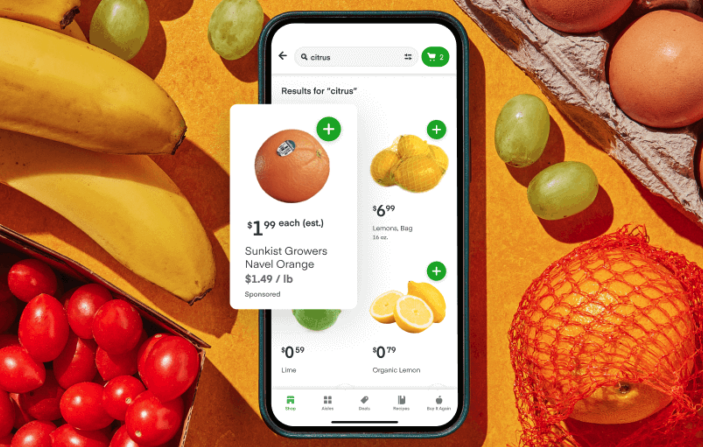Instacart and DoorDash are improving access to healthy foods as part of their commitment to the latest White House initiative to reduce diet-related disease and increase food security.
The food delivery platforms join several other companies and organizations participating in the health-conscious push.
In the next six months, Instacart will partner with Boston Children’s Hospital and four other major healthcare providers in the U.S. to create “virtual food pharmacies”. Instacart will build these virtual storefronts for hospitals and health providers to give patients access to a space with specific, recommended foods and nutrition advice.
The digital grocer is also making fresh fruits and vegetables more visible on the app by introducing an advertising feature that allows companies to advertise weighted produce. Previously only packaged produce could be advertised.
The new nutrition features are part of the continued momentum for Instacart Health, which launched in partnership with the White House last year. Instacart Health programs include Fresh Funds, where organizations, nonprofits, insurance companies and employers give digital stipends to consumers in need to buy nutritious food on the app. The program Care Carts enables healthcare providers and caregivers to order groceries on behalf of someone else—such as a clinician ordering a patient items for their prescribed meal plan.
“We know that access to nutritious foods can deliver healthier outcomes, but a number of challenges have prevented healthcare providers from effectively adopting food as medicine programs at scale,” said Sarah Mastrorocco, vice president and general manager of Instacart Health, in a statement. “With Instacart Health, we have the unique opportunity to partner with providers to expand proven nutrition programs and more deeply integrate food as medicine into standard patient care.”
In addition, the company is conducting four new studies with researchers at Mount Sinai Hospital, the University of Kentucky, the University at Buffalo, the Stanford Cancer Institute, the University of California, and San Francisco’s Helen Diller Family Comprehensive Cancer Center, to study the impact of nutrition security and “food is medicine” services on different patient groups, including those with low incomes.
Meanwhile, DoorDash promised by 2025 to increase the availability of produce on the DoorDash marketplace by partnering with grocers in the U.S. and highlighting healthy products. The delivery giant will also work with grocery partners to allow the use of EBT as a payment and offer access to SNAP/EBT for grocery delivery.
“As part of our mission to empower local economies, we’re proud to broaden food access for the communities we serve,” said Max Rettig, vice president of public policy and social impact at DoorDash, in a statement. “Local delivery can help reduce transportation and other barriers by giving people access to nutritious food and healthy choices in a convenient and dignified way.”
In September, DoorDash partnered with 18 U.S. mayors to broaden food access in their communities by providing $1 million in Community Credits gift cards, proprietary DoorDash data on local food access needs and direct funding for in-kind delivery of charitable donations.


